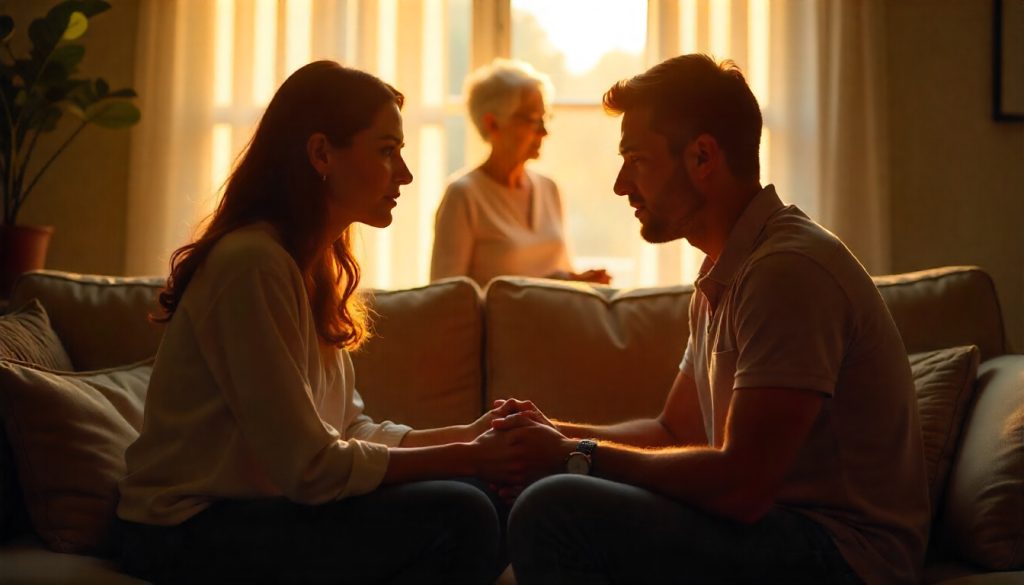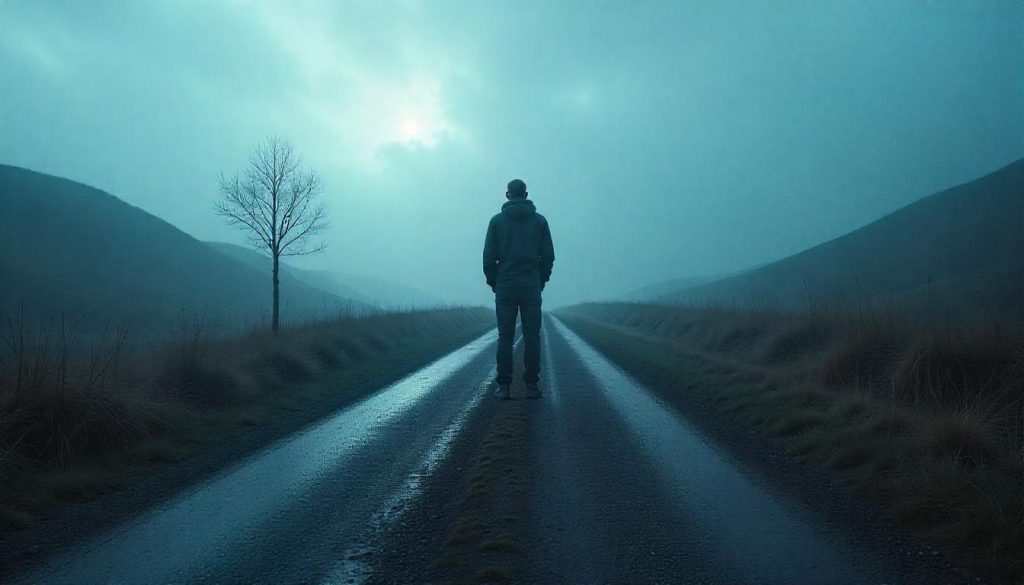La douleur profonde de la perte d'un être cher peut sembler totalement dévorante. Le deuil, un voyage profondément personnel et non linéaire, remodèle souvent l'univers d'une personne, rendant la perspective d'un bonheur futur lointaine, voire impossible. Pour beaucoup, l'idée de trouver l'amour après la perte d'un être cher peut même être ressentie comme une trahison, une déloyauté à l'égard de la mémoire chérie de la personne disparue. Cependant, le cœur humain possède une extraordinaire capacité de guérison et de connexion. Si le chemin à parcourir est indubitablement complexe et requiert un immense courage, la possibilité d'entamer un nouveau chapitre de camaraderie et d'affection peut finir par émerger.
Il ne s'agit pas de remplacer ce qui a été perdu, mais plutôt de permettre au cœur de s'élargir et d'embrasser de nouvelles expériences sans diminuer la signification profonde de l'amour passé. L'établissement de nouvelles relations après un deuil implique un équilibre délicat entre l'hommage aux souvenirs, la reconnaissance du chagrin persistant et l'ouverture à la vulnérabilité. Cet article vise à fournir des conseils empreints de compassion, en abordant le paysage émotionnel, les craintes courantes, les étapes pratiques et la dynamique unique impliquée dans la recherche et la construction de nouvelles relations après avoir subi une perte profonde.
Le paysage du deuil : Comprendre votre parcours
Avant d'envisager une nouvelle relation, il est essentiel de comprendre la nature du deuil lui-même. Le parcours de chaque individu à travers le deuil est unique et personnel.
Le deuil n'est pas linéaire
Le deuil suit rarement une progression prévisible, étape par étape. Au contraire, il survient souvent par vagues, avec des périodes de tristesse intense entrecoupées de moments de normalité ou même de joie. Des éléments déclencheurs peuvent apparaître de manière inattendue, ramenant les souvenirs et la douleur au premier plan. Il est donc essentiel de comprendre qu'aller de l'avant ne signifie pas "surmonter" la perte. L'amour pour la personne décédée restera toujours une partie de ce que vous êtes.
L'autorisation de faire son deuil
Il est essentiel d'aller de l'avant dans la vie, ce qui n'équivaut pas à oublier la personne décédée. Il ne s'agit pas de la remplacer, mais plutôt d'intégrer la perte dans l'histoire de votre vie et de trouver des moyens de vivre utilement votre deuil. Accordez-vous la permission de vivre pleinement votre deuil, aussi longtemps qu'il le faudra, sans culpabilité ni pression pour vous conformer à des échéances extérieures. Cette autorisation interne constitue une base essentielle pour toutes les étapes ultérieures.
Identifier votre état de préparation
Déterminer si l'on est prêt à s'engager dans une nouvelle relation est une évaluation profondément personnelle. Il s'agit de faire la distinction entre une véritable préparation émotionnelle et les pressions extérieures, telles que la solitude ou les attentes de la société. Parfois, des amis ou des membres de la famille bien intentionnés peuvent vous encourager à sortir avec quelqu'un avant que vous ne soyez vraiment prêt, ce qui peut entraîner une détresse émotionnelle supplémentaire. Il est primordial d'écouter sa boussole intérieure.
Le caractère unique de chaque perte
L'impact du deuil varie considérablement en fonction de la relation. La perte d'un conjoint ou d'un partenaire de longue date, par exemple, implique de s'adapter à l'absence d'un confident principal, d'une histoire commune et d'une routine quotidienne. La perte d'un enfant, en revanche, représente un défi différent et souvent plus profond pour l'identité et les aspirations futures d'une personne. Reconnaître la nature unique de votre perte permet de valider votre expérience personnelle du deuil.
Quel est le "bon" moment ? Naviguer dans l'état de préparation
Il n'existe pas de calendrier universel pour déterminer à quel moment il convient d'envisager de recourir à la trouver l'amour après la perte d'un être cher. C'est peut-être l'une des questions les plus fréquemment posées, mais à laquelle il est impossible de répondre.
Pas de calendrier universel
Chaque personne vit son deuil à un rythme différent. Ce qui semble trop tôt pour une personne peut être une progression naturelle pour une autre. Il n'y a pas de nombre magique de mois ou d'années après lesquels il est "acceptable" de sortir à nouveau avec quelqu'un. Concentrez-vous plutôt sur votre état émotionnel interne plutôt que sur des repères externes ou des attentes sociétales. Votre parcours est le vôtre.
Signes émotionnels de préparation
Bien qu'il n'existe pas de liste de contrôle définitive, certains indicateurs émotionnels suggèrent que l'on est prêt à envisager une nouvelle compagnie :
- De la tendresse, pas une douleur insurmontable : Vous pouvez penser à la personne décédée avec tendresse, gratitude et amour, plutôt que d'être accablé par la douleur, la colère ou le désespoir.
- Se réengager dans la vie et les intérêts : Vous avez commencé à redécouvrir la joie des loisirs, des amitiés et des activités quotidiennes, au lieu de les accomplir par obligation.
- Le désir de compagnie, pas seulement un vide : Vous ressentez un véritable désir de partager des expériences et d'entrer en contact avec quelqu'un de nouveau, distinct d'un besoin désespéré de combler un vide laissé par la perte.
- Réduction de la culpabilité ou de la peur de "remplacer" : La culpabilité ou la peur intense de "remplacer" l'être cher perdu s'est considérablement atténuée, ce qui permet d'envisager de nouveaux liens affectifs. Ces signes indiquent un état d'esprit plus sain pour aller de l'avant.
Signes avant-coureurs d'un manque de préparation
À l'inverse, certains signes suggèrent que le moment n'est peut-être pas opportun :
- Chercher un "remède" au chagrin : Sortir avec quelqu'un uniquement pour soulager un chagrin intense, une dépression ou la solitude, en espérant qu'un nouveau partenaire résoudra votre douleur émotionnelle.
- A la recherche d'une réplique de la personne décédée : Recherche inconsciente de quelqu'un qui reflète les traits, les comportements ou les rôles de l'être cher disparu.
- Sortir avec quelqu'un en raison de la solitude ou de la pression de la société : S'engager dans une relation amoureuse uniquement parce qu'on pense qu'on "doit" le faire ou parce qu'on se sent intensément seul, plutôt que par désir sincère d'une nouvelle connexion. S'engager dans une relation avec de telles motivations peut conduire à la déception et à un nouveau chagrin d'amour pour toutes les personnes impliquées.
Craintes et culpabilité fréquentes dans la recherche de l'amour après la perte d'un être cher
La décision d'ouvrir à nouveau son cœur après un deuil s'accompagne souvent d'un ensemble complexe de craintes et d'une profonde culpabilité. Ces émotions sont tout à fait normales.
Culpabilité de "passer à autre chose
De nombreuses personnes en deuil sont aux prises avec une immense culpabilité, se sentant comme si trouver l'amour après la perte d'un être cher est une trahison à l'égard du partenaire décédé. Ce conflit interne se manifeste souvent par la crainte d'être déloyal ou de manquer de respect à la mémoire de la personne aimée. Il est important de se rappeler que l'amour n'est pas une ressource limitée ; ouvrir son cœur à un nouvel amour ne diminue pas l'amour que l'on avait et que l'on continue d'avoir pour quelqu'un d'autre.
La peur de l'oubli
Il peut y avoir une peur profonde qu'une nouvelle relation efface ou éclipse les précieux souvenirs de l'être cher disparu. Cette inquiétude peut conduire à l'auto-sabotage ou à une réticence à s'investir pleinement dans une nouvelle relation, comme pour protéger le passé. Cependant, les souvenirs sont gardés en vous et une nouvelle relation peut être un espace où ces souvenirs sont honorés, et non oubliés.
La peur de la comparaison
La crainte d'un nouveau partenaire d'être constamment comparé, par soi-même ou par d'autres, à la personne décédée est une angoisse courante. Cette crainte peut exercer une pression énorme sur la nouvelle relation, car personne ne peut jamais vraiment prendre la place d'un autre. Reconnaître ouvertement cette crainte peut aider à gérer les attentes de toutes les parties.
Peur d'une deuxième perte
Après avoir vécu la douleur dévastatrice de la perte, la vulnérabilité d'aimer à nouveau peut être terrifiante. La peur d'endurer une seconde fois un chagrin aussi profond est compréhensible. Cette appréhension peut faire hésiter les personnes à s'engager pleinement ou à se permettre de retomber profondément amoureuses, comme si le fait de se retenir pouvait empêcher la douleur future.
La peur du jugement
Les personnes endeuillées sont souvent confrontées au jugement de diverses sources : les membres de la famille qui peuvent ressentir la perte trop vivement pour accepter un nouveau partenaire, les amis qui peinent à comprendre, voire le nouveau partenaire lui-même s'il ne saisit pas les complexités du deuil. Pour faire face à ces opinions extérieures, il faut faire preuve de résilience.
Naviguer en présence de la personne décédée
Les photos, les objets chéris, les histoires partagées et les traditions familiales permanentes sont autant de rappels de la personne décédée. L'intégration respectueuse de ces éléments dans une nouvelle relation, sans les laisser prendre le pas sur le nouveau lien, est un équilibre délicat. Une communication ouverte avec le nouveau partenaire sur le rôle de la personne décédée dans votre vie peut faciliter cette intégration.
Étapes pratiques pour retrouver l'amour après la perte d'un être cher
Une fois que vous vous sentez véritablement prêt à explorer de nouvelles relations, certaines mesures pratiques peuvent faciliter la transition vers les rencontres et les relations amoureuses. trouver l'amour après la perte d'un être cher.
Commencer lentement et doucement
Il n'y a pas d'urgence. Commencez par renouer avec la vie sociale dans des contextes non romantiques. Renouez avec des amis, rejoignez des clubs ou des groupes correspondant à vos centres d'intérêt, ou pratiquez de nouveaux passe-temps. Cela vous aidera à reconstruire votre réseau social et votre confiance en vous sans la pression immédiate d'un rendez-vous. Envisagez des interactions sociales décontractées avant les rendez-vous officiels.
Communiquer sur votre parcours
Lorsque vous commencez à sortir avec quelqu'un, soyez honnête au sujet de votre passé et de votre parcours de deuil. Il n'est pas nécessaire d'en dire trop lors d'un premier rendez-vous, mais à mesure que la relation s'approfondit, il est essentiel d'être transparent. Expliquez que l'être cher que vous avez perdu fera toujours partie de vous, mais que vous êtes prêt à ouvrir votre cœur à de nouvelles expériences. L'honnêteté favorise la compréhension.
Choisir les bonnes personnes à fréquenter
Recherchez des partenaires qui font preuve d'empathie, de patience et de compréhension. Recherchez des personnes qui sont à l'aise avec la vulnérabilité, qui écoutent attentivement et qui ne craignent pas les conversations difficiles. Évitez ceux qui vous poussent à "passer à autre chose" ou qui semblent menacés par votre passé. Un partenaire qui vous soutient est inestimable.
Accepter la vulnérabilité (progressivement)
Partager son histoire, son chagrin et ses craintes demande du courage. Faites-le progressivement, à un rythme qui vous convient. Observez comment un partenaire potentiel réagit à votre vulnérabilité. Sa réaction vous en dira long sur sa capacité d'empathie et de soutien.
Gérer les attentes
Reconnaissez que cette nouvelle relation sera différente de celle que vous avez perdue. Elle aura sa propre dynamique, ses propres joies et ses propres défis. Essayer de reproduire le passé ne peut que conduire à la déception. Accueillez la nouveauté et permettez à la relation de se dérouler de manière authentique.
Rechercher des systèmes de soutien
Appuyez-vous sur votre réseau de soutien existant, composé d'amis et de membres de la famille qui comprennent votre parcours. Envisagez de vous joindre à un groupe de soutien aux personnes en deuil, même si vous sortez avec quelqu'un, car il offre un espace sûr pour traiter les émotions persistantes. Une thérapie individuelle peut également vous apporter une aide précieuse dans cette phase complexe.
Plateformes de rencontres et activités sociales
Lorsque vous vous sentez prêt, explorez les plateformes de rencontres ou les activités sociales qui correspondent à vos intérêts. Les rencontres en ligne peuvent permettre une communication ouverte sur votre passé avant de vous rencontrer en personne. La participation à des activités qui vous plaisent vraiment peut également déboucher sur des connexions naturelles et organiques.
Construire une nouvelle relation : Dynamique et défis uniques
Construire une nouvelle relation après une perte présente une dynamique unique qui nécessite de la patience, de la communication et une compréhension mutuelle de la part des deux partenaires.
Intégration des souvenirs
Un aspect crucial de la trouver l'amour après la perte d'un être cher est d'intégrer les souvenirs de la personne décédée dans votre nouvelle vie, et non de les enterrer. Cela signifie qu'il faut trouver une place saine pour les photos, les histoires et les anniversaires. Discutez avec votre nouveau partenaire de la meilleure façon d'honorer ces souvenirs dans le respect de votre personne, de la personne décédée et de votre relation actuelle.
Gérer les anniversaires et les fêtes
Les dates importantes, telles que l'anniversaire de la personne décédée, l'anniversaire de son décès ou les fêtes partagées, peuvent être particulièrement difficiles à gérer. Communiquez ces dates à votre nouveau partenaire à l'avance. Discutez avec lui de la manière dont vous souhaiteriez lui rendre hommage, que ce soit par une réflexion silencieuse, un rituel personnel ou le partage d'un souvenir. La sensibilité de votre partenaire à ces moments est vitale.
Présentation des enfants et de la famille
Si des enfants sont concernés, l'introduction d'un nouveau partenaire peut être un processus complexe et délicat. Le cheminement des enfants dans le deuil est souvent différent de celui des adultes, et ils peuvent se sentir menacés ou déloyaux à l'égard de leur parent décédé. Procédez lentement, impliquez les enfants de manière adaptée à leur âge et envisagez de faire appel à un professionnel pour vous aider à gérer cette délicate dynamique familiale.
Le rôle de la culpabilité pour le nouveau partenaire
Parfois, le nouveau partenaire peut, par inadvertance, ressentir de la culpabilité ou de l'insécurité quant à son rôle, se demandant s'il est à la hauteur de l'être cher décédé. Il est essentiel de le rassurer, de valider ses sentiments et de l'aider à comprendre que son amour pour la personne décédée ne diminue pas son amour pour lui. Une communication claire sur la nature distincte des deux amours est essentielle.
Établir de nouvelles traditions
S'il est important d'honorer les traditions passées, en créer de nouvelles avec son nouveau partenaire permet de consolider la nouvelle relation. Ces expériences partagées construisent une histoire unique et favorisent un sentiment d'identité commune, pour aller de l'avant en tant que couple. Ce processus vise à construire un nouvel avenir.
La communication est primordiale
Une communication ouverte et continue sur les sentiments, les craintes et les limites liées au deuil est primordiale. Les deux partenaires doivent se sentir à l'aise pour exprimer leurs émotions sans être jugés. L'écoute active et l'empathie de part et d'autre renforceront les liens qui vous unissent au cours de ce voyage unique.
Pièges de la comparaison
Évitez consciemment de comparer votre nouveau partenaire à l'être cher décédé. Chaque individu est unique et chaque relation a son propre caractère. Concentrez-vous sur l'appréciation de votre nouveau partenaire pour ce qu'il est et les qualités uniques qu'il apporte à votre vie. Le fait de s'attarder sur les comparaisons peut nuire à la nouvelle relation.
Les récompenses de la recherche de l'amour après la perte d'un être cher
Malgré les nombreux défis, les récompenses de la trouver l'amour après la perte d'un être cher peuvent être profondes, témoignant de la résilience de l'esprit humain.
Joie et camaraderie renouvelées
Une nouvelle relation amoureuse peut apporter une joie immense, de la compagnie et un profond soulagement de la solitude. Partager les moments de la vie, petits et grands, avec un partenaire qui vous soutient peut raviver un sentiment d'utilité et de bonheur qui semblait perdu.
Croissance personnelle
Naviguer dans les complexités du deuil tout en ouvrant à nouveau son cœur favorise un immense développement personnel. Cela peut élargir votre capacité émotionnelle, approfondir votre empathie et renforcer votre résilience d'une manière que vous n'auriez peut-être pas crue possible. Vous découvrez de nouveaux aspects de vous-même.
Un nouveau chapitre
Une nouvelle relation signifie un nouveau chapitre de votre vie, rempli d'expériences nouvelles et d'opportunités de croissance. C'est l'occasion de créer de nouveaux souvenirs, de se lancer dans de nouvelles aventures et de construire un avenir riche et significatif. Cela n'efface pas le passé, mais s'y ajoute.
Preuve de résilience
Réussir le voyage de la trouver l'amour après la perte d'un être cher est une preuve puissante de votre résilience. Elle démontre votre force, votre capacité à guérir et votre aptitude inébranlable à aimer et à vous rapprocher, même après un profond chagrin d'amour.
Guérir par la connexion
Le pouvoir thérapeutique d'une relation de soutien et d'empathie ne peut être surestimé. Un nouveau partenaire qui comprend et respecte votre chagrin peut vous fournir une base sûre, vous aidant à continuer à guérir et à grandir dans la sécurité d'une relation amoureuse. Il s'agit là d'une forme unique de réconfort.
Conclusion
La décision de s'embarquer dans le voyage de trouver l'amour après la perte d'un être cher est profondément personnelle et incroyablement courageuse. Elle témoigne de la remarquable capacité de guérison, de résilience et de connexion durable de l'esprit humain. Si le deuil fait partie intégrante de votre histoire, embrasser un nouvel amour ne consiste pas à remplacer ce qui a été perdu. Il s'agit plutôt d'élargir le cœur, d'honorer le passé et de s'engager courageusement dans un nouveau chapitre épanouissant. En empruntant ce chemin avec compassion, en communiquant ouvertement et en ayant des attentes réalistes, les individus peuvent créer un nouvel avenir caractérisé par la joie, la camaraderie et un profond sentiment de paix. La présence d'un nouvel amour n'efface pas l'importance de l'amour passé ; au contraire, elle permet au cœur de continuer à donner et à recevoir de l'affection, démontrant ainsi la beauté durable de la vie.











